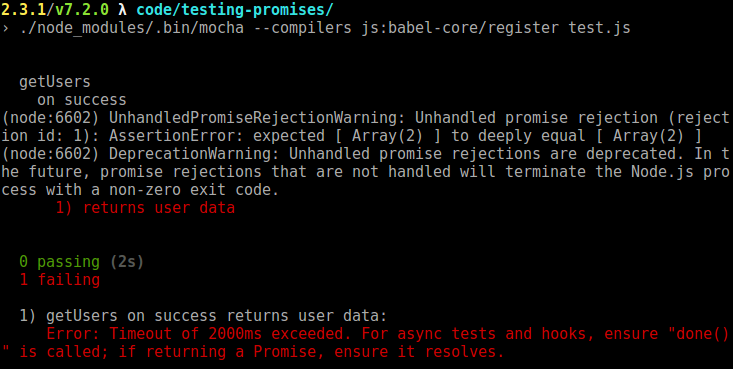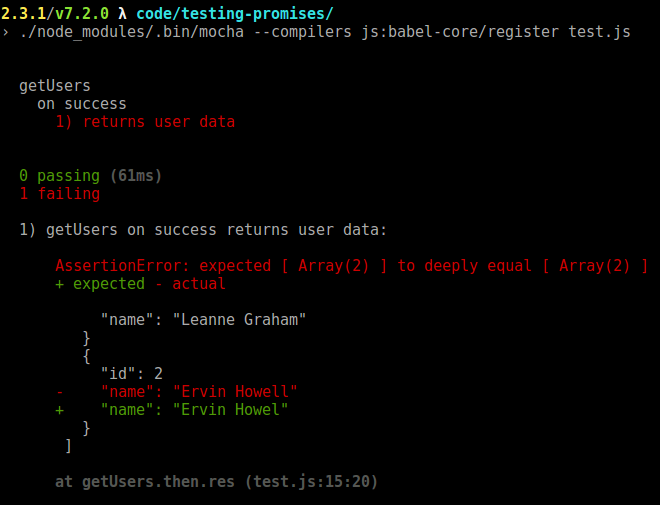While testing asyncronous code, especially Promises, I seen that many people are using
done() method in wrong way. This post tries to guide you how to do it in proper way.
Conside we are going to test a piece of code which fetches data asynchronously.
// api.js
require('whatwg-fetch');
module.exports = class ApiClient {
static get(url) {
return fetch(url)
.then(res => {
return res.json();
})
.catch(err => {
throw err;
});
}
}
// index.js
const ApiClient = require('./api');
module.exports = function getUsers() {
return ApiClient.get('http://jsonplaceholder.typicode.com/users')
};
Now when we try to write a simple test for getUsers it will look like
// test.js
const getUsers = require('./index');
const ApiClient = require('./api');
const sinon = require('sinon');
const expect = require('chai').expect;
describe('getUsers', () => {
context('on success', () => {
it('returns user data', (done) => {
const getSpy = sinon.stub(ApiClient, 'get').returns(Promise.resolve([
{id: 1, name: 'Leanne Graham'},
{id: 2, name: 'Ervin Howell'}
]));
getUsers().
then((res) => {
expect(res).to.eql([
{id: 1, name: 'Leanne Graham'},
{id: 2, name: 'Ervin Howell'}
]);
done();
})
});
});
});
The above test will work fine and show the test passing, But calling done() in the same then callback is a bad idea.
Why?
The above code works well until your expectation fails, consider the above code with wrong expectation
// test.js
const getUsers = require('./index');
const ApiClient = require('./api');
const sinon = require('sinon');
const expect = require('chai').expect;
describe('getUsers', () => {
context('on success', () => {
it('returns user data', (done) => {
const getSpy = sinon.stub(ApiClient, 'get').returns(Promise.resolve([
{id: 1, name: 'Leanne Graham'},
{id: 2, name: 'Ervin Howell'}
]));
getUsers().
then((res) => {
expect(res).to.eql([
{id: 1, name: 'Leanne Graham'},
- {id: 2, name: 'Ervin Howell'}
+ {id: 2, name: 'Ervin Howel'}
]);
done();
})
});
});
});
This will throw some error like below.

The above failure is not very useful for programmers, Mocha is well equiped to show better error than this. If we want to utilize the
mocha’s error we shouldn’t call done() from the same then() callback. See the below test
// test.js
const getUsers = require('./index');
const ApiClient = require('./api');
const sinon = require('sinon');
const expect = require('chai').expect;
describe('getUsers', () => {
context('on success', () => {
it('returns user data', (done) => {
const getSpy = sinon.stub(ApiClient, 'get').returns(Promise.resolve([
{id: 1, name: 'Leanne Graham'},
{id: 2, name: 'Ervin Howell'}
]));
getUsers().
then((res) => {
expect(res).to.eql([
{id: 1, name: 'Leanne Graham'},
{id: 2, name: 'Ervin Howel'}
]);
})
+ .then(() => done(), done);
});
});
});
Now see the difference in the mocha’s failure message with actual and expected diff.

Isn’t this error message better for programmers to debug the failure.
UPDATE : 2017-01-22
There is even better way, Thanks to @blakeembrey.
@revathskumar FWIW, you shouldn't use `done` at all with mocha (https://t.co/ijOcbpydV3) - you should just return the promise directly
— Blake Embrey (@blakeembrey) November 28, 2016
We don’t need to use done at all, instead we can just return the promise from it block.
// test.js
const getUsers = require('./index');
const ApiClient = require('./api');
const sinon = require('sinon');
const expect = require('chai').expect;
describe('getUsers', () => {
context('on success', () => {
it('returns user data', () => {
const getSpy = sinon.stub(ApiClient, 'get').returns(Promise.resolve([
{id: 1, name: 'Leanne Graham'},
{id: 2, name: 'Ervin Howell'}
]));
+ return getUsers().
then((res) => {
expect(res).to.eql([
{id: 1, name: 'Leanne Graham'},
{id: 2, name: 'Ervin Howel'}
]);
});
});
});
});